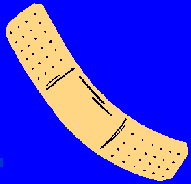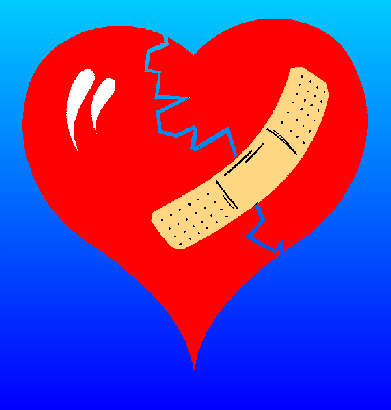


Commentary - Toxic Intern Syndrome
by Kirsti A. Dyer MD, MS
I made a promise to myself during medical school that it would not happen to me. My first priority would be patient care and my patients' well-being. I wanted to treat them with respect and dignity. I was determined not to become inured to patients' requests and their pain, as had occurred with many of the interns and residents before me. I do not know exactly when it began, but I soon succumbed to "Toxic Intern Syndrome."
The affliction was pointed out to me by a close friend who informed me mid-way through my intern year that he no longer wanted me as his physician. I had changed. The process was gradual, occurring over time, and was probably the result of coping with the reality and daily hassles of residency. The naïvete and compassion that I had as a medical student had been replaced with the ennui and callousness of a toxic intern. But I was not unique. Talking to other interns revealed that I was not the only one changing. I stepped back to examine what was happening.
The duration, severity, and onset of the syndrome are highly variable. Some interns contract it earlier in the year, some later, and others presumably exhibit immunity. It is difficult to predict whom or when it will hit or how long it will last.
The signs and symptoms also vary. The signs are expressions of fatigue--slumped shoulders, nodding off during meetings, and perpetual dark circles under the eyes. Irritability mixed with anger is a common symptom. Another is recurrent irritation with support staff, residents, attendings, consultants, patients, and hospital systems of the Department of Veterans Affairs (VA). Depending on the duration of the irritating stimulus or the cumulative effects of multiple aggravating situations, this can create irrational and illogical behavior. The behavior frequently manifests in the form of "scapegoating" (yelling at the wrong nurse for an order not completed or blaming them for the intern's own omission), venting anger at a staff member or technician who had nothing to do with the original problem, or raising his or her voice in frustration to patients. Scapegoating ts also used against friends, family, and loved ones as the toxic intern takes frustrations from work out on someone at home who has no control or influence over any of it.
 The
symptoms can occur in a passive-aggressive form, striking back at residents,
nurses and patients. Typically they involve an order or test inadvertently
"forgotten." Of they may occur as a slow response to nurses for ridiculous
cross-cover calls. Or a patient may be allowed to leave the hospital against
medical advice [AMA] with no attempt made to persuade the patient to stay.
The
symptoms can occur in a passive-aggressive form, striking back at residents,
nurses and patients. Typically they involve an order or test inadvertently
"forgotten." Of they may occur as a slow response to nurses for ridiculous
cross-cover calls. Or a patient may be allowed to leave the hospital against
medical advice [AMA] with no attempt made to persuade the patient to stay.
A pervasive sense of cynicism develops as another means of coping. By now the emphasis has shifted from helping others to energy conservation and managing time efficiently. This is evident in the language used. Patients are viewed as "hits" and residents complain about getting "slammed" on call with admissions. Patients may be checked out as being "stable" only to "go bad" soon after their team is out of the hospital. The "dumps" take on many forms. The chronic-care, or nursing home patient is "dumped off" prior to long weekends, to become the responsibility of the hospital. Patients can also be "dumped" within departments, from one service to another, and from one hospital to another. The classic example is the veteran male who is emergently transferred to the VA hospital once a military service record is established. Patients are described as "wimps," "drug-seekers," "gomers," and "worthless scum."
Survival becomes a peculiar game, one that frequently neglects the patients' best interests. The goal is not to admit patients, rather to "bounce" or "turf" them to other services, to reject transfers, and to immediately discharge when the patient's condition becomes stable. The game may necessitate coercing other departments into providing the consultation or needed tests. On weekends or after hours at the VA, it means relying on hope and prayer that the patients will not get sick, because it requires even more than the normal hassle to get basic laboratory or Y-rays done.
The cause of the syndrome is relatively clear--too much "scut" work (some common unfinished task), too little pay, and too many hours spent in the hospital. The hours are frequently spent dealing with the patients' social issues, rather than the medical illnesses. Nursing home candidates cannot be placed because of funding or "undesirable characteristics," so they stay until a nosocomial [hospital acquired] infection occurs, creating an even longer stay in the hospital. Alcoholics initially present with massive gastrointestinal bleeds, are transfused, treated, and released only to return bleeding again after yet another drinking binge. Gang members are admitted with gunshot wounds after an altercation; rival members must be separated in the hospital and visitors carefully monitored. Intravenous drug users present with skin-popping abscesses demanding high doses of pain medication for minor dressing changes or develop a new heart murmur, endocarditis, buying a six-week in-house course of intravenous antibiotics.
 By
this time the syndrome has taken it's toll. Now the toxic intern forces
patients to walk on post-operative day number one and listens to intraveneus
drug injectors and patients with gunshot or stab wounds complain without
increasing their pain medication. (The down side to this is that suddenly
everyone is suspected of drug-seeking behavior.) The tocix intern will
interrupt patients during long, rambling, historical recounts, forcing
them to get to the point. The intern becomes oblivious to pain elicited
during procedures, while incising and draining drun-induced abscesses,
during lumbar punctures or paracenteses, and while placing central venous
lines. Disability benefits are denied to those wanting them for back pain,
gunshot wounds, or obesity. The toxic intern gradually resents the sense
of entitlement found in many medical patients who want everything done,
but are frequently the most non-compliant and have contributed little for
their medical treatment.
By
this time the syndrome has taken it's toll. Now the toxic intern forces
patients to walk on post-operative day number one and listens to intraveneus
drug injectors and patients with gunshot or stab wounds complain without
increasing their pain medication. (The down side to this is that suddenly
everyone is suspected of drug-seeking behavior.) The tocix intern will
interrupt patients during long, rambling, historical recounts, forcing
them to get to the point. The intern becomes oblivious to pain elicited
during procedures, while incising and draining drun-induced abscesses,
during lumbar punctures or paracenteses, and while placing central venous
lines. Disability benefits are denied to those wanting them for back pain,
gunshot wounds, or obesity. The toxic intern gradually resents the sense
of entitlement found in many medical patients who want everything done,
but are frequently the most non-compliant and have contributed little for
their medical treatment.
Unfortunately there may not be a cure, short of stopping the toxic impulses before they occur. Once a person becomes infected with the Toxic Intern Syndrome, she or he is never quite the same. It becomes a strong coping mechanism for internship and residency, providing interns with the ability to turn off their emotions. Survival, not patient care, becomes the first priority. There are periods of exacerbation and remission during residency that usually subside once a person enters private practice. For those who stay in academia, there is the protective affect of being an attending, keeping them insulated from the daily problems and allowing them to remain relatively symptom-free.
The only effective treatment is prevention. This would require restructuring much of the current health system. Medicaid, medicare, health care for the indigent and illegal aliens, and insurance programs would all need to be revised into a more user-friendly system, one less susceptible to misuse and abuse. It would also require revamping residency programs, limiting work hours, and creating a pay scale with benefits (an unlikely event because of the cost).
The frustration of trying to
cope with daily battles, coupled with constant stress and fatigue eventually
leads to resignation, realization that the system will not change, and
finally complacency. The ultimate coping mechanism is to just sit back,
relax, and take it. It is easier than constantly fighting. The toxic intern
can only hope that recurrences are short-lived, and that patients, in the
long run, don't suffer too much.
